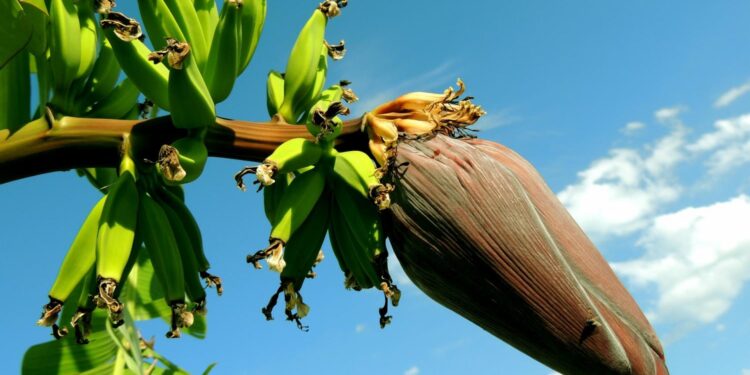Credit: CC0 Public domain
Researchers have developed a banana plant resistant to both tropical fusarium race 4 (TR4) and black Sigatoka, two of the most destructive diseases for banana plants.
Plant pathology professor Gert Kema of Wageningen University and Research sees the development of the new hybrid, named Yelloway One, as a major breakthrough in banana cultivation, saying: “We have known for some time that conventional breeding can help us develop plants resistant to “
The development of Yelloway One comes at a critical time for global banana cultivation. TR4 and black Sigatoka have caused significant damage in recent years, resulting in losses worth hundreds of millions of dollars. Until now, no resistant banana varieties have been available, putting immense pressure on farmers and the banana sector as a whole.
Yelloway One is the product of conventional breeding techniques. The plant is resistant to TR4, a fungus capable of devastating entire plantations, and to black Sigatoka, a leaf disease which drastically reduces yields. These two diseases have long posed a threat to the banana industry, particularly the widely exported Cavendish banana.
This breakthrough was achieved through a collaboration between Chiquita, KeyGene, MusaRadix and Wageningen University & Research. The team of experts used a combination of traditional breeding techniques and modern DNA analysis technologies to accelerate the process of developing resistant banana varieties. This allowed them to more quickly and efficiently breed new varieties with desired traits, such as disease resistance.
“The fact that banana producer Chiquita is one of the partners does not mean that other banana producers will not have access to these new varieties,” explains Kema. “We are working with several organizations to ensure this technology is available for other programs as well. Additionally, we use technology to develop or improve varieties for local markets.
Yelloway One is still a prototype and is currently grown in a greenhouse in the Netherlands. The plants will soon be shipped to areas in the Philippines and Indonesia, where TR4 and black Sigatoka have caused significant damage. Field testing will determine how Yelloway One performs in a natural environment. These trials are crucial to assess whether Yelloway One can provide a viable solution to farmers in severely affected regions.
Yelloway One is the first step in the broader Yelloway initiative. The goal is to develop a continuous flow of excellent, resilient and genetically diverse banana varieties. This will not only increase the resilience of banana cultivation, but also improve the sustainability of the sector. By introducing more variety into crops, farmers will be better equipped to respond to climate change and new diseases.
“This development is of great importance for millions of smallholder farmers in Africa, Asia and Latin America,” says Kema. “By introducing resistant and genetically diverse varieties, we can contribute to a more sustainable banana industry and reduce the impact of diseases.” Kema expects that more resilient and innovative banana varieties will follow in the coming years, making the banana sector less vulnerable to disease and environmental threats.
Provided by Wageningen University
Quote: Researchers develop the first banana plant resistant to TR4 and black Sigatoka (October 1, 2024) retrieved October 1, 2024 from
This document is subject to copyright. Except for fair use for private study or research purposes, no part may be reproduced without written permission. The content is provided for informational purposes only.



